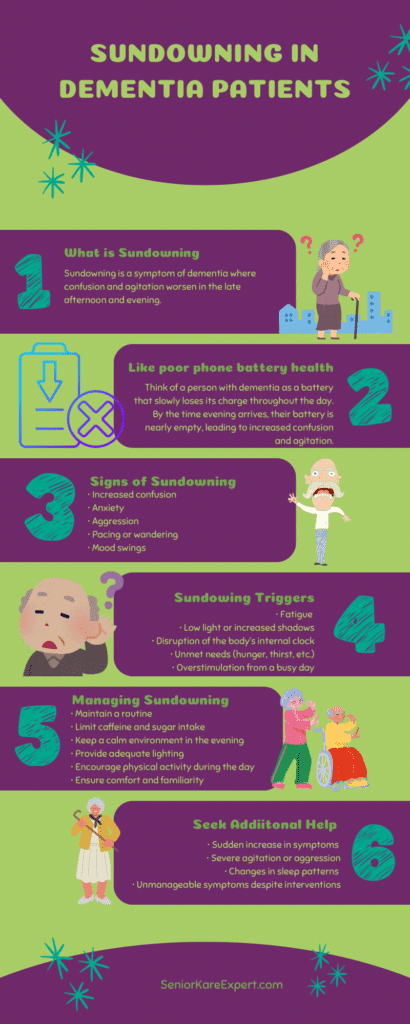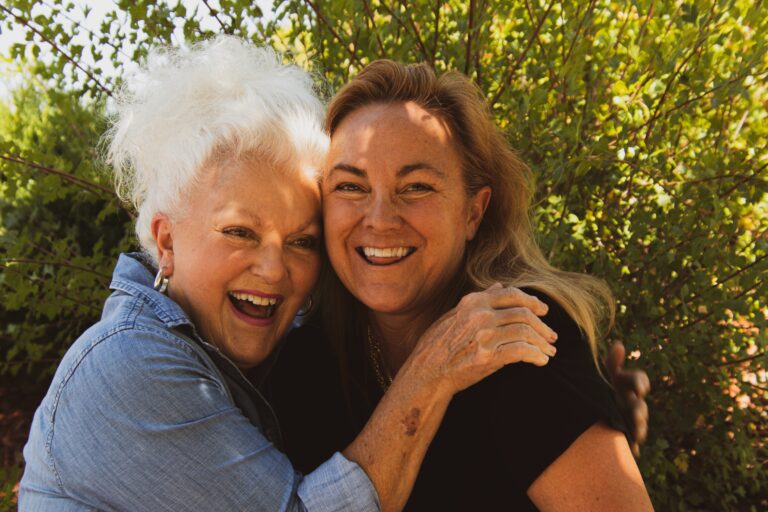Let’s talk about sundowning. No, it’s not a new yoga pose but it is something that everyone with a loved one who has dementia should be familiar with. Sundowning is a term used to describe a common symptom in people with dementia. Let’s dive into what sundowning is, why it happens, and how we can manage it.
What is Sundowning?
Sundowning is an increase in confusion and agitation that occurs later in the day and into the night. I try to simplify this as: a dementia patient’s “brain battery” gets drained throughout the day. By the time the sun goes down, their cognitive reserve is low, making it harder for them to manage their emotions and behaviors. Individuals with dementia may become more restless, confused, and irritable.
Symptoms of sundowning can include:
- Restlessness
- Confusion
- Irritability
- Agitation
- Mood swings
This period can be particularly challenging for caregivers as they manage increased demands from their loved ones during these hours.
Causes of Sundowning
Understanding the causes of sundowning can help us manage it better. Several factors contribute to this phenomenon:
- Circadian Rhythm Disruption: Our internal body clock gets out of sync in dementia patients, leading to increased confusion and agitation. This can also affect their hours of sleep.
- Fatigue and Exhaustion: As the day goes on, both physical and mental fatigue set in, making it harder for the brain to function optimally and they find it challenging to do everyday tasks.
- Low Light and Shadows: As daylight fades, shadows can cause confusion and fear, making patients more anxious. They often struggle with their peripheral vision.
- Unmet Needs: Hunger, thirst, or discomfort can amplify feelings of frustration and agitation.
- Medications Wearing Off: Some medications might lose their effectiveness by evening, leading to increased symptoms.
The “Older Phone” Analogy
Think of the brain like an older phone’s battery. In the morning, it’s fully charged and ready to go even though the “battery health” may be greatly diminished. But as the day progresses, regular activities drain the battery. Certain activities drain the battery faster. By late afternoon, the battery is low, causing the phone (or in this case, the brain) to glitch and slow down.
When the brain’s energy is low, it struggles to manage mood and behavior effectively. This low cognitive “battery” can lead to increased irritability, confusion, and restlessness – much like an overheated phone struggling to function properly.
Managing Sundowning
While sundowning can be challenging, there are practical ways to manage it. Here are some tips for caregivers:
- Establish a Routine: Keeping a consistent daily schedule helps reduce confusion and anxiety. Try to have meals, activities, and bedtime at the same time every day.
- Create a Calm Environment: Ensure the environment is calm and well-lit, especially as the day progresses. Reduce noise and distractions which can agitate the patient. With some seniors playing music from their teen years can also have a calming effect.
- Comfort and Reassurance: Providing comfort and reassurance can help soothe the patient. Gentle reminders and a calm voice can make a big difference. Picture flip books, memory boxes and even robotic pet therapy can help.
- Encourage Rest and Avoid Overstimulation: Ensure the patient gets adequate rest and avoid activities that might be too stimulating in the late afternoon and evening.
- Focus on One Task at a Time: Break down activities into simple steps and allow ample time to complete them. Use clear and simple communication to avoid frustration.
Addressing physical needs is also crucial:
- Ensure proper nutrition and hydration throughout the day.
- Monitor for any signs of pain or discomfort and address them promptly. How many times have you banged your hand or stubbed your toe unexpectedly and didn’t even realize it hurt until much later?
- Encourage regular physical activity during the day to promote better sleep at night. Morning walks, chair yoga or even dancing can be very helpful.
Understanding the Desire to “Go Home”
A common phrase you might hear from dementia patients is “I want to go home.” This isn’t always about a physical place, but rather a desire for comfort and familiarity. It can be a way of expressing anxiety or insecurity.
When responding to this request:
- Provide reassurance and validation.
- Acknowledge their feelings and comfort them.
- Redirect their attention to a comforting activity or memory.
- Avoid arguing about reality. Instead, offer gentle distractions that can shift their focus.
See a great explanation about what it means when seniors say ”I Want To Go Home.
Caregivers: The Unsung Detectives in Dementia Care
Imagine this: you notice your loved one’s behavior has changed. They seem more confused or agitated. Now, you’re not just a caregiver; you’re a detective, piecing together clues to understand what’s happening.
Why Caregivers Need Detective Skills
- Identifying Triggers:
- Changes in behavior can be sudden. Maybe it’s something as simple as a new routine or a change in environment. Detectives (caregivers) notice these subtle changes and adapt to ease the discomfort.
- Observing Patterns:
- Keep an eye on daily routines. Is there a specific time when confusion peaks? Perhaps right before meals or bedtime? Detectives track these patterns to manage and anticipate needs.
- Reading Non-Verbal Cues:
- People with dementia may struggle to express pain or discomfort. As a detective, you’ll look for signs like restlessness, facial expressions, or changes in appetite, which might indicate underlying issues.
Techniques and Tools for Caregiver Detectives
- Communication is Key:
- Use simple and clear language. Ask direct questions and give time for responses. Patience is crucial.
- Environmental Adjustments:
- Simplify their surroundings. Reduce clutter, ensure good lighting, and create a calm atmosphere. Sometimes, the smallest changes make the biggest difference.
- Health Monitoring:
- Regularly check for physical discomfort or changes in health. Detectives need to rule out infections or side effects from medications, which can mimic or worsen dementia symptoms.
A Real-Life Example
Mary noticed her husband, John, became increasingly agitated each afternoon. She started keeping a diary of his activities and behavior. Mary observed that John’s agitation spiked after watching certain TV shows. By adjusting the TV schedule and choosing more calming programs, John’s agitation significantly decreased.
The Power of Teamwork
- Caregiving doesn’t have to be a solo mission. Work with healthcare professionals, join support groups, and connect with other caregivers. Sharing insights can provide new clues and strategies.
Becoming a detective in dementia care means being observant, patient, and proactive. It’s about piecing together clues to create a better quality of life for your loved one. Remember, every small discovery is a step towards better care and comfort.
Common Behavioral Symptoms and Their Management
Dementia patients often exhibit a range of behaviors such as restlessness, pacing, and fidgeting. These behaviors are not necessarily harmful, but need to be managed to ensure safety and comfort. For example, wandering can provide physical exercise and social interaction, but it’s important to ensure that the individual is safe and does not enter unsafe areas or disturb others.
To manage these behaviors:
- Ensure they have access to assistive devices like walkers or canes.
- Provide a safe space for wandering, if possible.
- Protect their skin from irritation caused by prolonged movement by ensuring they wear comfortable clothing and well-fitting footwear.
Strategies for Specific Behaviors
Wandering and Pacing: These behaviors can be managed by ensuring that the individual is not experiencing discomfort, hunger, or the need to use the bathroom. Providing structured activities throughout the day can help reduce boredom, which is a common trigger for wandering. Marking bathrooms clearly and establishing a toileting schedule can also help.
Confusion and Agitation: Reduce noise and adjust lighting to minimize shadows in the evening. Encourage physical activity during the day to promote better sleep at night, and avoid long naps that might interfere with nighttime rest. Soft music can have a calming effect and help reduce agitation.
Responding to Hallucinations and Aggression
Hallucinations and aggression are challenging behaviors that require careful management. Hallucinations might be triggered by fatigue, medication side effects, or environmental factors. When responding to hallucinations, it’s important to stay calm, reassure the patient of their safety, and avoid confrontation. Consulting healthcare professionals for medication adjustments can also be beneficial.
Aggression, whether verbal or physical, can be disturbing and potentially dangerous. Typical triggers include frustration, fear, confusion, and physical discomfort. Preventing these behaviors from escalating requires a calm and reassuring approach. Always explain what you are about to do when caring for the patient, and avoid appearing rushed or impatient. If aggression occurs, protect yourself and others by maintaining a safe distance and avoiding physical contact.
Creating a Safe and Supportive Environment
A safe and supportive environment is crucial for managing sundowning and other dementia-related behaviors. This includes ensuring that the home is free of hazards that might cause falls or injuries. Simple modifications like securing loose rugs, ensuring good lighting, and removing clutter can significantly reduce the risk of accidents.
Additionally, using familiar objects and maintaining a routine can provide comfort and reduce anxiety. For example, placing pictures or familiar items outside rooms can help individuals with dementia find their way more easily, reducing confusion and distress.
Self-Care for Caregivers
Caring for someone with dementia is demanding and can take a toll on caregivers. It’s essential to prioritize self-care to maintain your own well-being. This includes managing stress, seeking support from friends, family, or support groups, and utilizing respite care options to take breaks and recharge. Adapting the home environment to be more supportive and using technology for monitoring can also ease the caregiving burden.
Remember: You’re not just a caregiver; you’re a detective, a guardian, and a hero.
Caregivers, you are not alone. Seek professional help when needed and maintain hope and patience. The journey of caregiving is demanding, but with the right support and strategies, you can make a positive impact on the lives of those you care for.

From a young age, Stacey’s link to the senior care industry grew alongside her mother’s work at a nursing home, where she often accompanied her. By her early teens, she secured her first official job at a nursing home, laying the foundation for a profound journey in senior care spanning over four decades. Her roles varied from opening assisted living and memory care residences to working in nursing homes and independent senior living communities. As the former Director of Fun for 300 independent seniors, she expertly organized daily events and trips. Stacey’s unwavering passion, nurtured by her family, and professional dedication as a recreation therapist, reflect her deep commitment to preserving the dignity and well-being of seniors.
Stacey’s senior care expertise has been recognized by the media including U.S. News and World Report and Care.com.
Stacey and her husband Bryan are the owners of the senior in-home care agency A Place At Home – North Austin.





